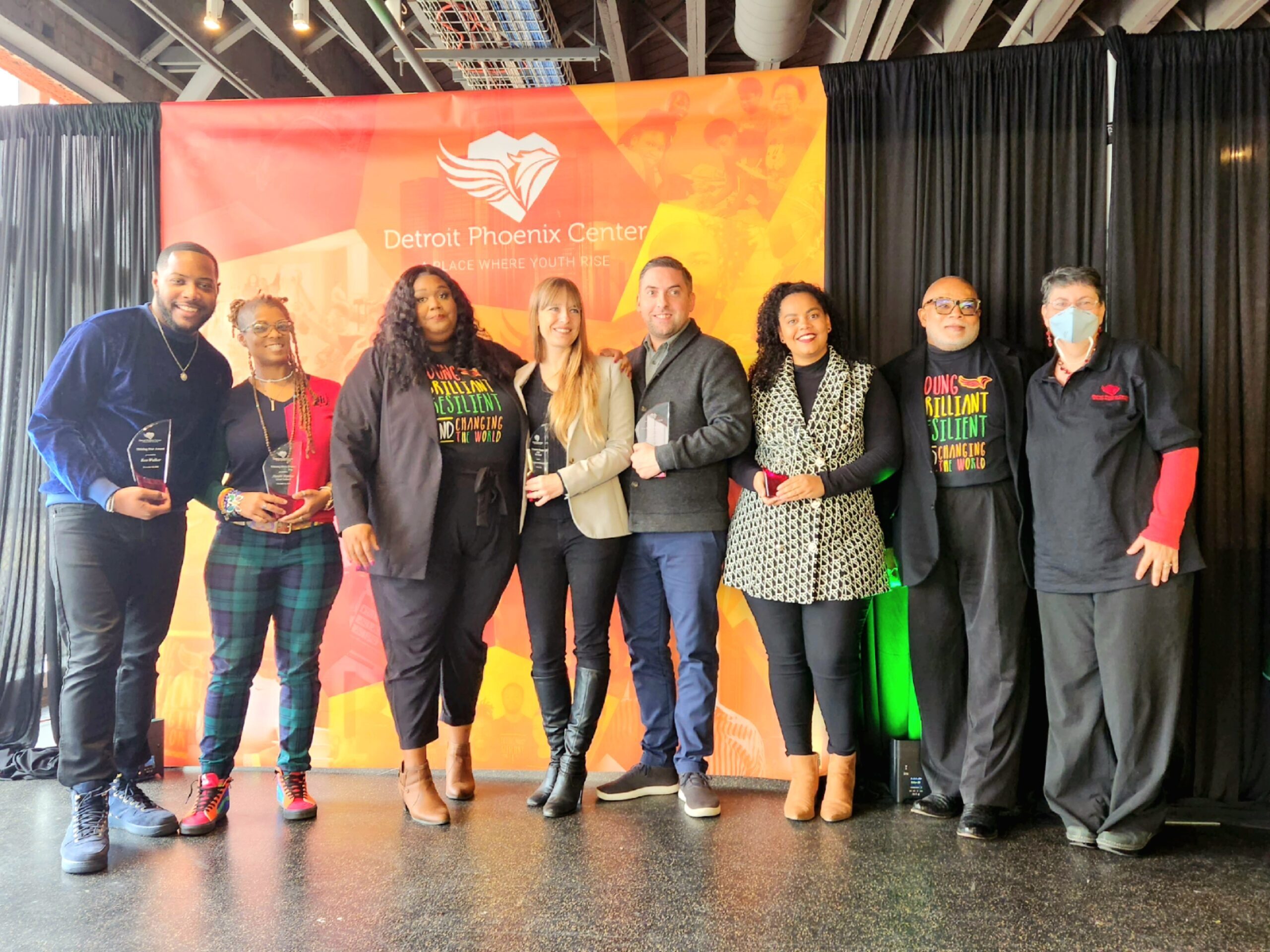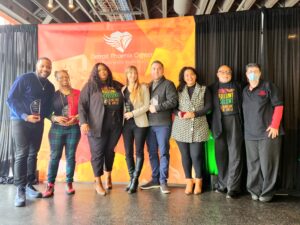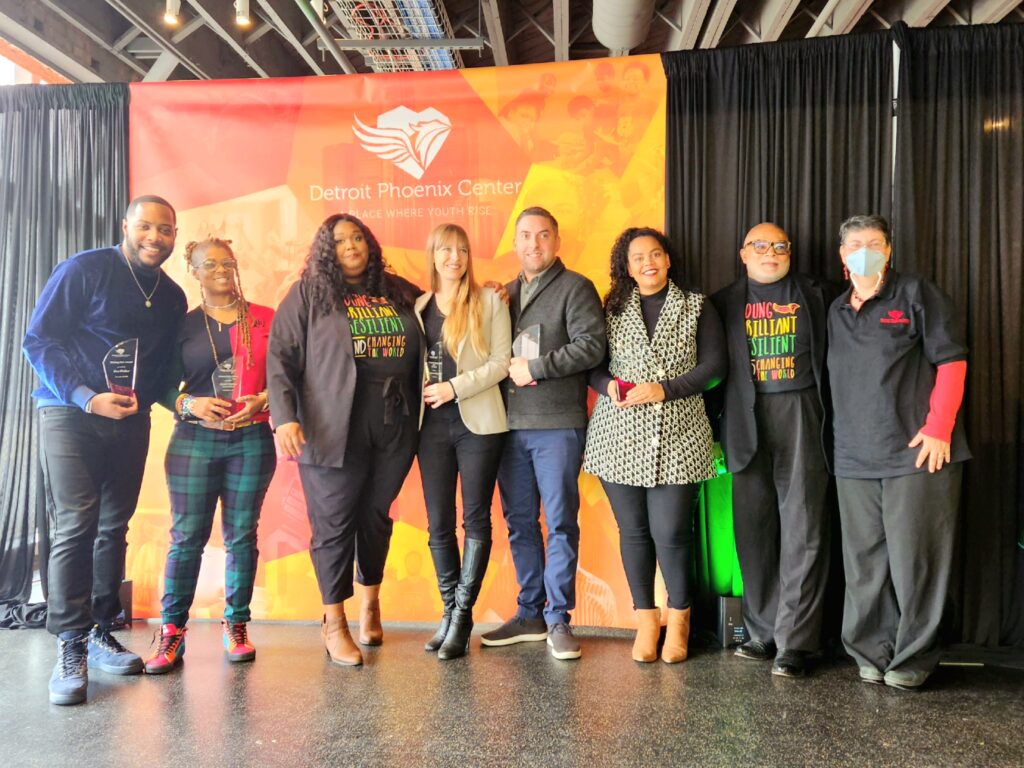Source: Special to Michigan News

Detroit Phoenix Center Founder and CEO Courtney Smith, third from left, stands beside Jennifer Erb-Downward of U-M’s Poverty Solutions (center), who was named DPC’s 2022 Community Champion of the Year.

Detroit Phoenix Center Founder and CEO Courtney Smith, third from left, stands beside Jennifer Erb-Downward of U-M’s Poverty Solutions (center), who was named DPC’s 2022 Community Champion of the Year.
In the wake of the economic upheaval of the pandemic, 43% of Detroit parents reported they fell behind on housing payments in 2021, putting their families at risk of eviction, housing instability, and homelessness. The Detroit Phoenix Center is a crucial source of support for youth in Detroit without a stable place to live. Every year, the nonprofit serves hundreds of young people, meeting their basic needs and offering leadership development opportunities. Courtney Smith, founder and CEO of the Detroit Phoenix Center, talked with the University of Michigan about how the organization meets immediate needs while pursuing systemic change.
What is the Detroit Phoenix Center’s mission, and who do you serve?
Detroit Phoenix Center is a high-impact nonprofit organization. We provide critical resources, support, and a safe and nurturing environment for teens and young adults in Detroit who are in need. In 2017, we opened the first drop-in center aimed at serving young people who struggled with housing insecurity or were actively experiencing homelessness. It’s basically a one-stop-shop where they can come to get their basic needs met, to connect with the community around them, and to gain stability according to what that looks like for them. We also connect them to emergency housing solutions through our various partners.
We serve 150 young people year-round, and we can touch up to 1,200 per year. The 150 youth are enrolled in various programs, whether it’s after school, youth leadership, or as a drop-in center member. We’re providing hygiene kits or food boxes, and we get a lot of crisis call referrals. We serve up to 1,200 youth per year through the various interventions we have to provide that immediate crisis support.
What are you excited to be working on now?
Though we are a direct service agency, we are focused on systems change by mobilizing young people in our community to drive that change. We believe those closest to the problem need to be the ones driving solutions. We started with our Youth Action Board, which has been a phenomenal group of young adults (working to eliminate barriers to housing, employment, education, and mental health and advocate for increased resources to youth in transitional housing arrangements). We were able to expand that through a six-week Summer Leadership Academy, and we just recently launched our year-round fellowship for high school students.
Tell us about a project you worked on with U-M.
We partnered with the University of Michigan’s Poverty Solutions on our Summer Leadership Academy to provide communications-focused workshops. I appreciated that some very tangible things came out of it like the video and poems. It really allowed the young people to see their work come to life in a way they maybe had not been able to see.
The partnership this summer was a culmination of many years of relationship, starting from the creation of The Educational Implications of Homelessness and Housing Instability in Detroit databook in partnership with Jennifer Erb-Downward. From there, the relationship has been super organic and we’ve been able to find various ways to support the young people. U-M has been a wonderful partner from facility space to thought partnership, research projects, and speaking engagements.
What did you value most about your partnership with U-M?
One thing I found very beneficial was the exposure our young people received in the communications training and the opportunity for them to have something they crafted come to life. With the young people we serve, many of them have said they don’t feel that their voices are heard. Being able to have a platform to elevate their voices and their brilliance has been immeasurable. On the other end, we could use what they created as a tool to educate our stakeholders and the greater population on some of the challenges our young people face and say here are their solutions.
What advice would you give to other organizations interested in partnering with U-M?
Be intentional about finding an area in which values align. That’s going to be super important when looking to formalize the relationship and to strengthen it. Don’t be afraid to look at a longer-term engagement. Look at many opportunities to partner. There were really many different avenues in which we were able to formalize a partnership, and we didn’t even have that in our vantage point at the very beginning when we started these discussions.


